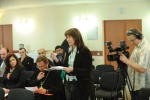Metropolitan Hilarion: all healthy forces in society should rally to prevent extinction of our population
Problems discussed by the Christian Inter-confessional Council in the CIS and the Baltic were a subject of the press conference given on May 13, 2011, by the CICC’s cochairmen – Metropolitan Hilarion of Volokolamsk, head of the Moscow Patriarchate’s department for external church relations, Archbishop Paolo Pezzi, ordinary of the Roman Catholic Archdiocese of the Mother of God in Moscow, and V. Vlasenko, director for external affairs of the Russian Union of the Evangelical Christians-Baptists.
Answering a question about the primary causes of the population crisis and ways of coming out of it, Metropolitan Hilarion reminded the journalists that before the 20th century, most families in Russia and Europe, regardless of the income and social status, were large. ‘But now large families have become a rarity while now the norm is a family with one or two children. There is an evident change in the very culture of founding a family and raising children’, he said and stated with regret that sometimes members of Christian Churches and communities fail also to give an example of creating a large family.
‘One can speak much about the obligation of the state, a cultural institution or the mass media but one should begin with oneself. First of all it is important to remind people of moral truths, to create a favorable atmosphere and to create social conditions necessary for extended families. I know of parishes in Moscow in which concern for large families is a priority in the pastoral work. They are given special attention, and parish leaders even try to find resources and means to improve their living accommodation. Conditions are created for children to feel comfortable during divine services and beyond the liturgy’, he said. In his opinion, it is necessary to give more attention to this aspect of parish life. ‘Social aid should be one of the priorities in our parish and pastoral work’, he said.
To deal successfully with the population problem, the Church and other religious communities, the state including the Ministry of Healthcare and Social Development and the Ministry for Education and Science, as well as the mass media and culture and art workers should unite their efforts. ‘All the healthy forces in society should rally to prevent the extinction of our population. It is necessary to reverse the alarming population tendency which has come to prevail in the last decades. For population growth to begin there must be economic and financial incentives but there must also be the preaching of the word of God. We need a policy aimed to support the family and traditional moral values. It should be carried out on the governmental level through the systems of healthcare and primary, secondary and higher education. Both the mass media and religious communities should help realize it’, the metropolitan said.
Metropolitan Hilarion also mentioned that the 2011 Bishops’ Council of the Russian Orthodox Church adopted several documents which dealt to this or that extent with support to be given to large families of the clergy including those in poor rural parishes. Reference was made to the need to establish loan-societies at the diocesan level. ‘It often happens so that a priest with many children serves at a poor parish and he cannot support his family through the parish means alone’.
The metropolitan added that at present the curriculum of theological seminaries and academies includes some elements of family ethics but the Church is still to develop a course covering all the problems facing the modern family and various aspects of the demographic situation.
Metropolitan Hilarion also reminded the audience of the work carried out by the Synodal Department for Charity and Social Service as one of its tasks is to develop programs for aid to large families and for support of motherhood and childhood.
DECR Communication Service
Other events
-
13.05.2011 20:03Metropolitan Hilarion: all healthy forces in society should rally to prevent extinction of our population
-
13.05.2011 18:15(Russian) Итоговый документ пленарного заседания Христианского межконфессионального консультативного комитета стран СНГ и Балтии (Москва, 13 мая 2011 года)
-
13.05.2011 18:15(Russian) В Москве состоялось заседание Христианского межконфессионального комитета стран СНГ и Балтии
-
13.05.2011 18:13(Russian) Митрополит Волоколамский Иларион: “Нам противостоит сильный и лукавый противник”


















